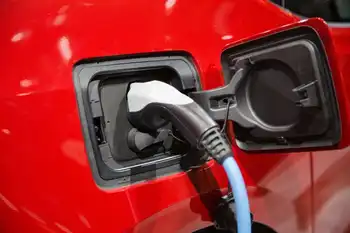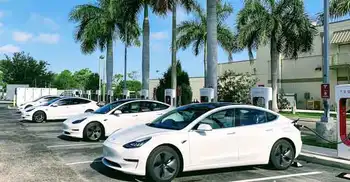Peak Power Receives $765,000 From Canadian Government to Deploy 117 V1G EV Chargers

Substation Relay Protection Training
Our customized live online or in‑person group training can be delivered to your staff at your location.

- Live Online
- 12 hours Instructor-led
- Group Training Available
Peak Power V1G EV chargers optimize smart charging in Ontario, using Synergy technology and ZEVIP support to manage peak demand, enhance grid capacity, and expand EV infrastructure across mixed-use developments with utility-friendly energy management.
Key Points
Peak Power's V1G smart chargers use Synergy tech to cut peak load and grow Ontario EV charging access.
✅ 117 chargers funded by NRCAN's ZEVIP program
✅ Synergy tech shifts load off peak to boost grid capacity
✅ Partners: SWTCH Energy and Signature Electric
Peak Power, a Canadian climate tech company with a core focus in energy management and energy storage, announces it has received a $765,000 investment through Natural Resources Canada’s (NRCan) Zero Emission Vehicle Infrastructure Program (ZEVIP) to install 117 V1G chargers as Ontario energy storage push intensifies province-wide planning. The total cost of the project is valued at over $1.6 million.
Peak Power will install the V1G chargers across several mixed-use developments in Ontario. Peak Power’s Synergy technology, which is currently used in the company’s successful Peak Drive EV charging project, will underpin the chargers. The Synergy tech will enable the chargers to draw energy from the grid when it’s most widely available and avoid times of peak demand, similar to emerging EV-to-grid integration pilots now, and can also adjust the flow rate at which the cars are charged. The intelligent chargers will reduce strain on the grid, benefiting utilities and electricity users by increasing grid capacity as well as giving EV drivers more locations to charge their vehicles.
As part of ZEVIP, the project supports the federal government’s goals of accelerating the electrification of Canada’s transportation sector. The 117 chargers will encourage adoption of EVs, as drivers have access to expanded infrastructure for charging, and as Ontario streamlines charging-station builds to accelerate deployments. From the perspective of grid operators, the intelligent nature of the Peak Power software will allow more capacity from the grid without requiring major infrastructure upgrades.
Peak Power will work with partners with deep expertise in EV charging to install the chargers. SWTCH Energy is co-developing the software for the EV chargers with Peak Power, while Signature Electric will install the hardware and supporting infrastructure.
“We’re thrilled to support the Canadian government's electrification goals through smart EV charging,” said Matthew Sachs, COO of Peak Power. “The funding from NRCan will enable us to provide drivers with more options for EV charging, while the smart nature of our Synergy tech in the chargers means grid operators don’t have to worry about capacity restraints when EVs are plugged into the grid, with EV owners selling power back offering additional flexibility too. ZEVIP is critical to greater electrification of the country’s infrastructure, and we’re proud to support the initiative.”
“Happy EV Week, Canada. Our government is making electric vehicles more affordable and charging more accessible where Canadians live, work and play, for example through the Ivy and ONroute charging network that supports travel corridors,” said the Honourable Jonathan Wilkinson, Minister of Natural Resources. “Investing in more EV chargers, like the ones announced today in Ontario, will put more Canadians in the driver’s seat on the road to a net-zero future and help achieve our climate goals.”
"I'm pleased to be announcing the deployment of over 100 Electric Vehicle chargers across Ontario with Peak Power,” said Julie Dabrusin, Parliamentary Secretary to the Minister of Natural Resources and to the Minister of Environment and Climate Change, and Member of Parliament for Toronto-Danforth. “This $765,000 investment by the Government of Canada will allow folks in Toronto and across the province to access the infrastructure they need, as B.C. expands EV charging shows national momentum, to drive an EV while fighting climate change. Happy #EVWeek!”
"Limited access to EV charging infrastructure in high-density mixed-used environments remains a key barrier to widespread EV adoption,” said Carter Li, CEO of SWTCH. “SWTCH’s partnership with Peak Power and Signature Electric to deploy V1G technology to these settings will enhance coordination between energy utilities, building operators, and EV drivers to improve building energy efficiency and access to EV charging infrastructure, with charger rebates in B.C. expanding home and workplace options as well.”
“Signature Electric is proud to be a partner on increasing the availability of localized charging for Canadians,” said Mark Marmer, Owner of Signature Electric. “Together, we can scale EV infrastructure to support Canada’s commitment to achieving net-zero emissions by 2050.”











